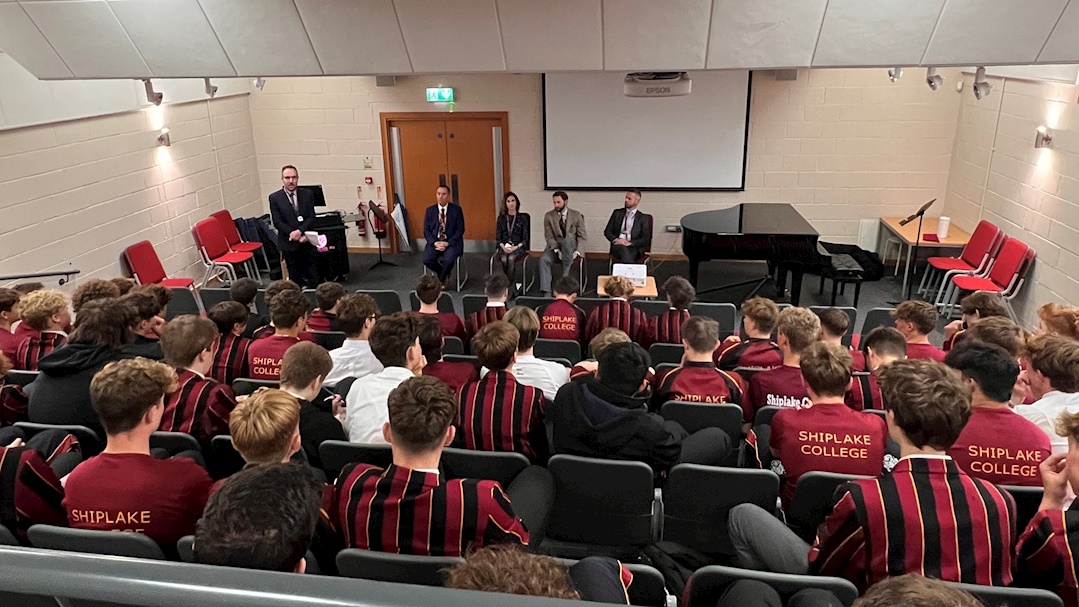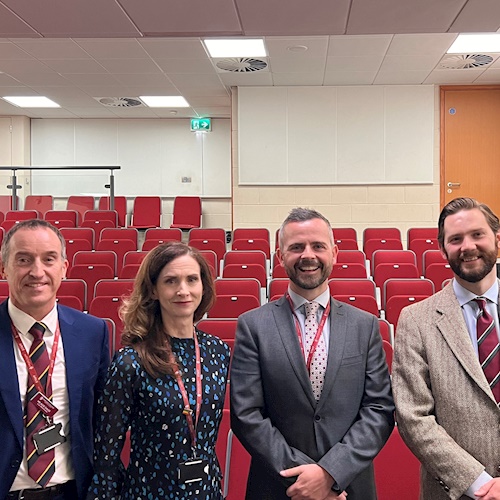
This afternoon, it was the turn of the Year 11 pupils to pose questions to staff for the first lunchtime Question Time of the academic year. Host Mr Player introduced the super panel which included debutant Mr Davis, who can "find x in a heartbeat"; the ‘gentleman and scholar’ that is Mr Shaw; the "Queen Bee of Criminology" Ms Magee; and finally, Mr Jones, who "may be in the choir, but will be bringing the fire".
With the passing of Queen Elizabeth II, what do you think is the role of the monarchy going forward? Do you expect it to change?
With a largely royalist panel, it was perhaps unsurprising that the general consensus amongst the panellists was that the monarchy is still hugely relevant to today’s society. Mr Jones believed that it is very hard for any nation state to capture that much love and affection, and that the Royal Family is still a hugely valuable part of British life. Touching on today’s political landscape, he added, "we are politically divided – monarchy unites us as a country."
Mr Shaw described himself as a "real royalist" and believes that monarchs can inspire love and affection, and that the fanatic attention that is given to them is done so in "a safe and contained environment."
Ms Magee largely agreed with the comments above, however, added that despite the amount of revenue generated by the Monarchy, they still cost the taxpayer a lot of money.
Mr Davis used last Monday, 19 September, as an example to illustrate his point. "The whole world’s attention was on the country and family on Monday. This is something that can be used to bring in revenue."
That said, the panel did all agree that the look of the Royal Family will begin to look dated and that perhaps it is time to move into a more "modern age" and scale back the attention given to the Royal Family – by focussing on the main members rather than the wider Family.
In light of the planned Artemis One launch, should we be focussing on space exploration or climate change?
Mr Davis, whose background is in the space industry having worked with the European Space Agency (ESA) for many years, was very keen to point out how many of today’s products and services have been brought about because of the space industry’s influence. He added that it will be worth sticking with the space industry to solve climate issues.
Ms Magee and Mr Shaw, however, were perhaps sceptical of this with the former bringing up the eye-watering £23 billion spent on the Artemis project and questioning if this money could have gone towards climate projects. Bringing in the media, she added that she understands why "space travel has more appeal than an image of a plastic bottle.”
Mr Shaw, while agreeing that the technology does have its benefits, also believed that the money should be spent on other projects.
Mr Jones likened space travel to a "vanity project" and agreed with Ms Magee on the irony in the media. As with those before him, Mr Jones also questioned the use of the money going towards space travel, particularly in light of the precarious position we as a planet find ourselves in regarding climate change.
The question was closed off with Mr Player asking Shiplake’s residential space expert about the possibility, or likelihood, of travelling to Mars. Here, Mr Davis was fairly sure that it is possible adding also, "we don’t know if the climate effect we’ve had on Earth is reversible - will we need to find another planet to live on?”
What is the point of detention? Does it even work?
A question that drew the largest reaction out of the crowd, the panellists were very keen to weigh in on this topic, as well as throwing in stories from their times at school.
Mr Shaw was first to answer the question and did so by raising the social reasons behind detentions. He said, “People will be free to do whatever they want without consequences. Detentions provide that consequence.”
Ms Magee, demonstrating her knowledge in criminology, used theories of conformity in her response - “many people don’t like receiving detentions and so this reinforces the conformity of abiding to rules. If you don’t conform, you will be punished.”
Mr Davis was next to speak and, while also agreeing that detentions have their place, added that there will always be people who do not care if they get into detention. He also raised the question as to whether there are other approaches or other options to avoid sanctions – including targeting the aspects of life that detention-goers do enjoy such as socialising and sport.
Last to weigh in was Mr Jones who, while agreeing with the principle of detention in that you will be punished if you don’t meet expectations, wanted to also highlight the balance with the rewards; 75% of all points (infraction and excellence) given out are excellence points. He concluded, however, with questioning the efficacy of detentions in the longer term. “There will come a point where detentions will no longer be effective so we need to look at alternative methods.”
When asked about any detention experiences from their school days, the panel, much to the amusement of the audience, did not disappoint with their anecdotes. Mr Jones was the unfortunate recipient of a double attention when his interpretation of “lines” was to draw along said lines. Meanwhile, Mr Shaw had been on the receiving end of detentions for talking in class, while Ms Magee had been thrown out of a Spanish class during her school days.








